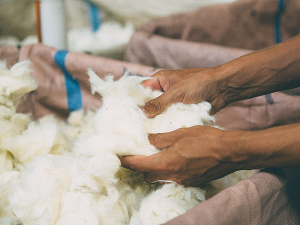Top wool advocate bales out
The conversion of productive farmland into trees has pretty much annihilated the wool industry.
 Godfrey Hirst is demanding Cavalier withdraw a number of claims promoting New Zealand wool as a more sustainable alternative to synthetic carpet.
Godfrey Hirst is demanding Cavalier withdraw a number of claims promoting New Zealand wool as a more sustainable alternative to synthetic carpet.
Carpet maker Cavalier is facing the wrath of American-owned rival Godfrey Hirst over the Kiwi company's push to promote more woollen products.
Godfrey Hirst has demanded Cavalier withdraw a number of claims in its marketing campaign, which promotes New Zealand wool as a more sustainable alternative to synthetic carpet fibres, or face legal action under the Fair Trading Act.
It claims that Cavalier and Bremworth had "demonised" synthetic carpets, with what it alleges were false and misleading references to single-use plastic bags and microplastics, and by lauding environmental wool carpets without acknowledging the full environmental impacts of wool carpet manufacturing, including livestock farming and wool scouring chemicals required for insect-resistant treatment of wool.
However, Cavalier is refusing to cower to its American rival. In a statement, released to the NZX, it says it will not shy away from promoting the virtues of wool.
It's not the first legal challenge from Godfrey Hirst, a former Australian company bought by New York Stock Exchange-listed global flooring manufacturer, Mohawk, in 2017.
Late last yearm under former chief executive Paul Alston, Cavalier announced that it was getting out of synthetic carpets altogether.
This was seen as a bold move, but new chief executive Greg Smith says the consumer feedback had so far been positive.
"From my perspective, I am very confident in the natural fibre strategy and the way that we are trying to reach our consumers," he recently told the NZ Herald.
He says wool carpets were Bremwoth's history: "100 per cent wool is where we started."
Smith acknowledges that there is a consumer preference for synthetic carpet.
"Clearly consumers have embraced synthetics, as they have done in lots of different industries," he concedes.
He added that the decision to stop making synthetic carpets was a difficult one. "There are always revenue implications when you give up a slice of your business to go down a different path."
Smith points to the ban on plastic bags and the electric car subsidy as proof of the consumer landscape changing quickly.
"These things are all happening because consumers and want a more sustainable future," he says.
Smith believes that natural solutions are becoming more "normal".
Tickets are now available for Beef + Lamb New Zealand’s (B+LNZ) Out the Gate, returning from 19-21 May 2026 at Te Pae, Christchurch.
Dairy Women's Network (DWN) is welcoming AgriHealth as a new partner.
Northland Field Days patron Ross Newlove remembers the inaugural field days he attended 40 years ago.
Southland farmer Murray Donald has been appointed as chair of Safer Farms, the industry-led organisation focused on reducing harm, injuries and fatalities in the agricultural sector.
National Lamb Day returns this Sunday, 15 February, with Beef + Lamb New Zealand Inc calling on Kiwis to fire up their barbecues and celebrate the people and the product that put New Zealand on the world map.
When it comes to arranging the sound system at Northland Field Days, no one does it better than Colin Finlayson.

OPINION: Here w go: the election date is set for November 7 and the politicians are out of the gate…
OPINION: ECan data was released a few days ago showing Canterbury farmers have made “giant strides on environmental performance”.